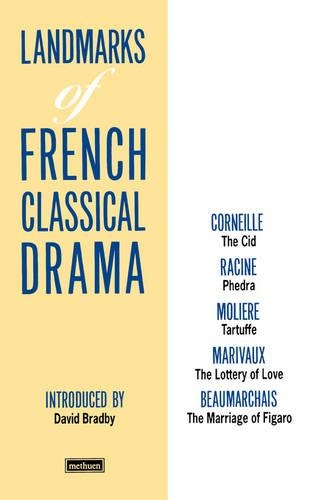
Landmarks Of French Classical Drama: The Cid; Phedra; Tartuffe; The Lottery of Love; The Marriage of Figaro
(Paperback)
Publishing Details
Landmarks Of French Classical Drama: The Cid; Phedra; Tartuffe; The Lottery of Love; The Marriage of Figaro
By (Author) Molire
Edited by David Bradby
By (author) Pierre Marivaux
Bloomsbury Publishing PLC
Methuen Drama
1st August 2006
United Kingdom
Classifications
General
Non Fiction
Anthologies
842.408
Physical Properties
Paperback
400
Width 126mm, Height 198mm, Spine 24mm
510g
Description
Contains five works from the classical period of French theatre - The Cid, Phedra, Tartuffe, The Lottery of Love and The Marriage of Figaro.
Author Bio
Molire (born Jean-Baptiste Poquelin in 1622) was a French playwright and actor-manager. Molire's main achievement was in raising the standard of French comedy to a level commensurate with French tragedy. In doing so he created a body of work that would continue to be performed for the next three centuries, providing generation after generation of performers with some of their finest roles. David Bradby (b. 1942) was one of the great pioneers of theatre studies in Britain. He had a strong interest in French theatre, modernist and postmodernist theatre, the role of the director, and the Theatre of the Absurd, as well as translating several works. He was Professor Emeritus of Drama and Theatre at Royal Holloway and was made a Chevalier des Arts et des Lettres by the French government in 1997. He died aged 68 in 2011. Pierre Carlet de Chamblain de Marivaux (1688-1763) was a French playwright, novelist, and journalist whose work is characterized by an extreme subtlety of language and feeling. This idiosyncratic style was referred to, originally disparagingly though now more respectfully, as Marivaudage. Marie-Nicolas Bouillet writes in her Dictionnaire Universel: "It is this that constitutes Marivaudage - a fastidious affectation in the style, a great subtlety in the feelings, and an immense complication in the plots." Marivaux began his career as a journalist and haunter of fashionable salons. In 1720, however, he lost his fortune and quickly produced three plays, two of which, L'Amour et la Vrit and Arlequin Poli par l'Amour, were performed by the Comdie-Italienne whilst the third, Annibal, was performed by the Comdie-Franaise. Although Marivaux continued to write for both companies, the majority of his plays were written for the Italian troupe, whose productions proved far more successful, perhaps because they better appreciated the refinements of his style. In the 20th century Marivaux's sophisticated plotting, keen sense of psychological nuance, and strong female roles have gained increasing recognition. Recent decades have seen frequent revivals of his plays by the Comdie-Franaise. For many years it was thought that Marivaux's comedies were virtually untranslatable due to the subtlety of the language, but several of his works have been successfully performed in English since the mid 1970s.
